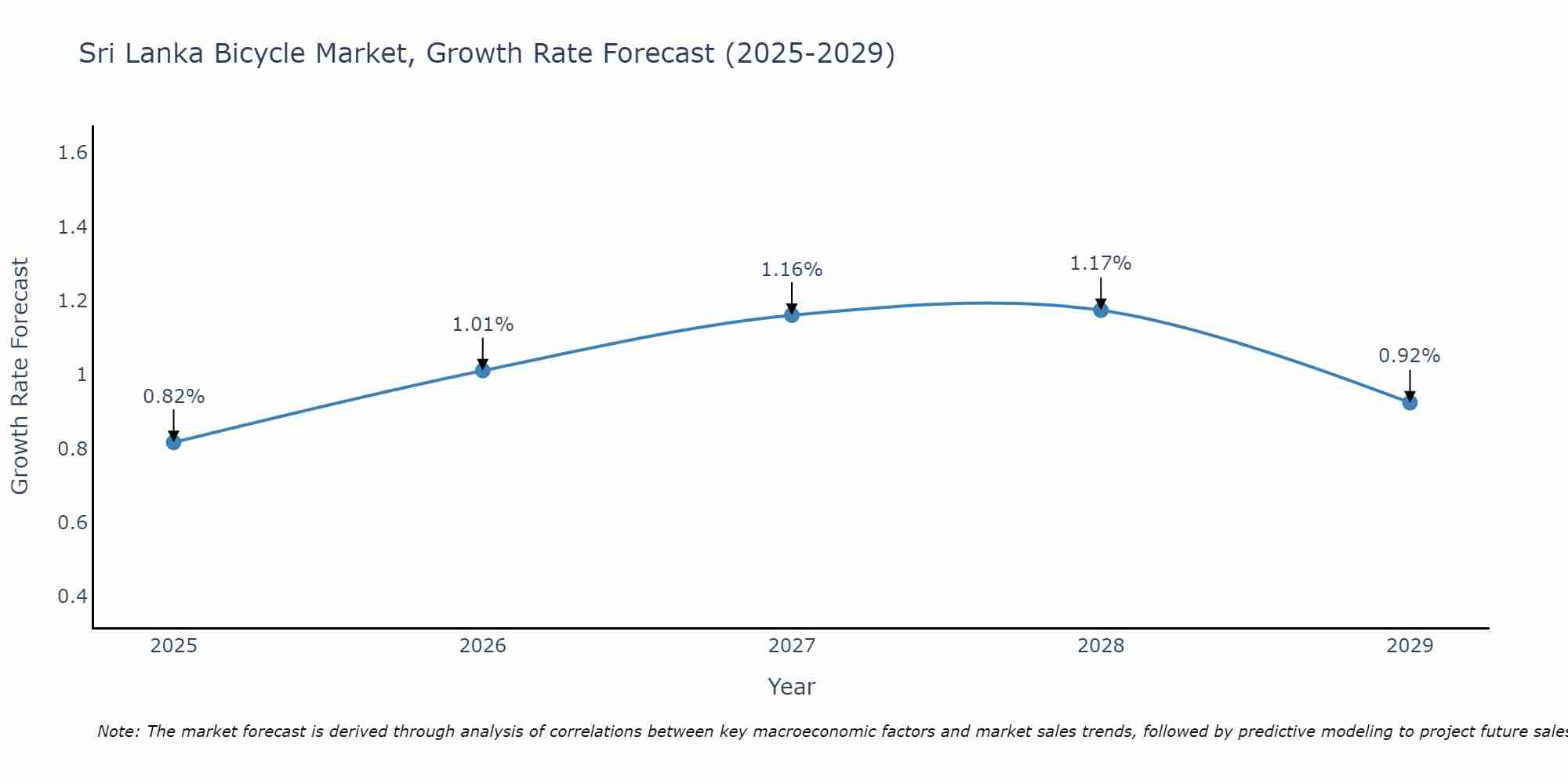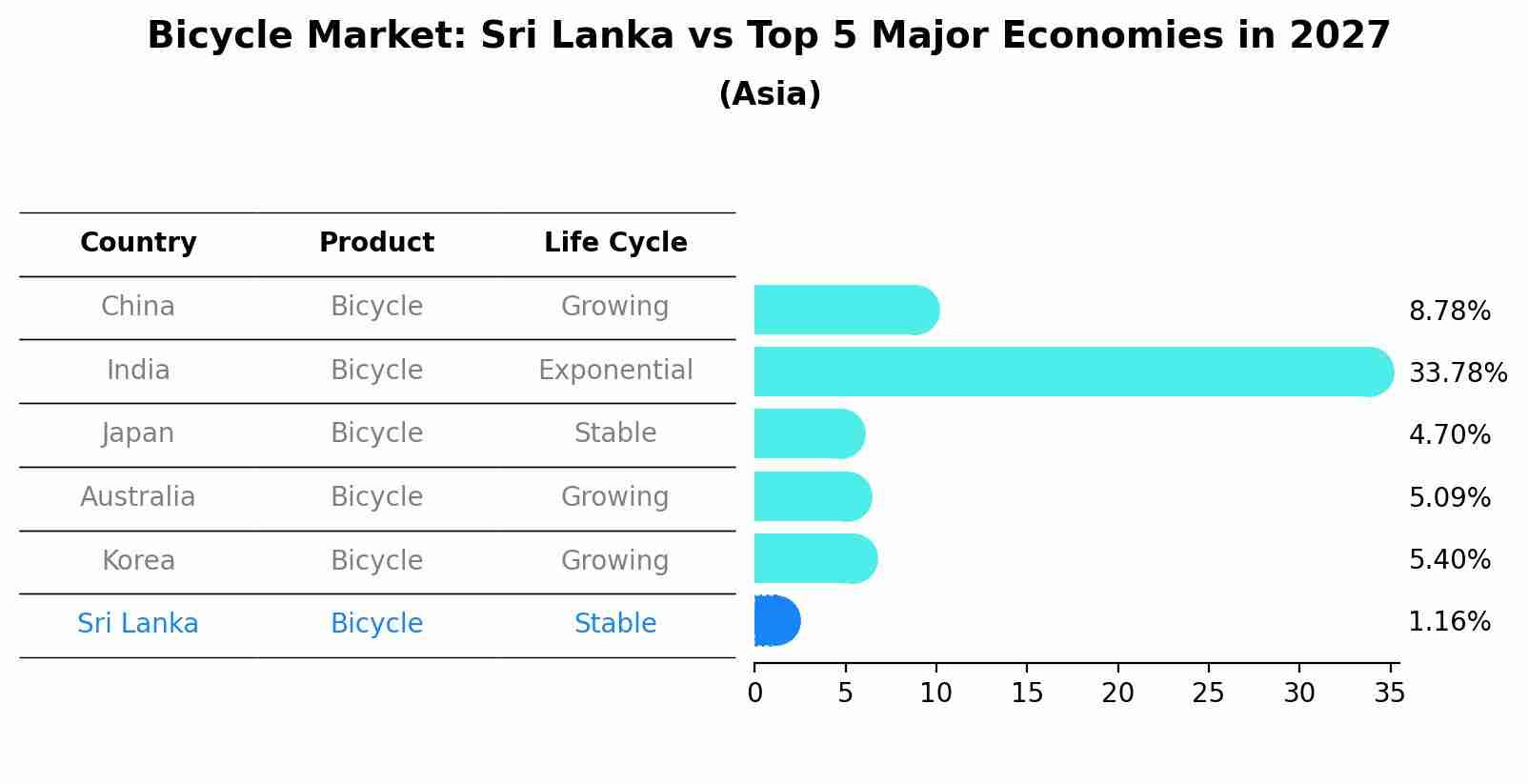Sri Lanka Bicycle Market Outlook | Companies, Value, Analysis, Share, COVID-19 IMPACT, Industry, Revenue, Trends, Forecast, Size & Growth
| Product Code: ETC362131 | Publication Date: Aug 2022 | Updated Date: Aug 2025 | Product Type: Market Research Report | |
| Publisher: 6Wresearch | Author: Dhaval Chaurasia | No. of Pages: 75 | No. of Figures: 35 | No. of Tables: 20 |
Sri Lanka Bicycle Market Size Growth Rate
The Sri Lanka Bicycle Market is projected to witness mixed growth rate patterns during 2025 to 2029. Starting at 0.82% in 2025, the market peaks at 1.17% in 2028, and settles at 0.92% by 2029.

Bicycle Market: Sri Lanka vs Top 5 Major Economies in 2027 (Asia)
In the Asia region, the Bicycle market in Sri Lanka is projected to expand at a stable growth rate of 1.16% by 2027. The largest economy is China, followed by India, Japan, Australia and South Korea.

Sri Lanka Bicycle Market Synopsis
The Sri Lanka bicycle market is experiencing steady growth driven by factors such as increasing health consciousness, rising awareness about eco-friendly transportation options, and government initiatives promoting cycling as a sustainable mode of transport. Consumers are increasingly opting for bicycles for commuting, leisure, and fitness purposes. Mountain bikes, road bikes, and electric bikes are gaining popularity among the urban population. Key players in the market are focusing on introducing innovative products with advanced features to cater to the diverse needs of consumers. The market is also witnessing a surge in online sales channels, providing convenience and accessibility to customers. With a growing emphasis on sustainability and health, the Sri Lanka bicycle market is expected to continue its upward trajectory in the coming years.
Sri Lanka Bicycle Market Trends
The Sri Lanka bicycle market is currently witnessing a growing interest in electric bicycles (e-bikes) due to their eco-friendly and cost-effective nature. Consumers are increasingly looking for sustainable transportation options, and e-bikes provide a convenient and efficient way to commute in urban areas. There is also a trend towards customization and personalization, with consumers seeking unique designs and features in their bicycles. Additionally, the demand for higher-end bicycles with advanced technology and lightweight materials is on the rise among enthusiasts and professional riders. The market is becoming more competitive, with both local and international brands offering a wide range of options to cater to the diverse preferences of consumers in Sri Lanka.
Sri Lanka Bicycle Market Challenges
In the Sri Lankan bicycle market, one of the key challenges is the lack of infrastructure to support cycling as a popular mode of transportation. The country`s road network is often congested and not well-equipped with designated bike lanes or safe cycling paths, leading to safety concerns for cyclists. Additionally, the perception of cycling as a lower-status mode of transportation compared to motor vehicles poses a challenge in promoting bicycles as a viable and sustainable option for commuting. Limited consumer awareness about the health and environmental benefits of cycling further hinders market growth. Addressing these challenges would require investment in infrastructure development, awareness campaigns, and initiatives to promote cycling as a convenient and eco-friendly transportation choice in Sri Lanka.
Sri Lanka Bicycle Market Investment Opportunities
The Sri Lanka bicycle market presents several investment opportunities due to increasing interest in cycling as a recreational activity and eco-friendly mode of transportation. Potential areas for investment include the manufacturing and distribution of bicycles to cater to the growing demand from both urban and rural areas. Additionally, there is a rising trend towards electric bicycles in Sri Lanka, creating a niche market for investors looking to capitalize on the shift towards sustainable transportation options. Furthermore, opportunities exist in the development of cycling infrastructure, such as dedicated bike lanes and rental services, to support the growing cycling culture in the country. Overall, the Sri Lanka bicycle market offers promising investment prospects for businesses looking to tap into the rising popularity of cycling among the population.
Jordan Agar Market Government Policies
The Sri Lankan government has implemented various policies to promote the use of bicycles in the country. These policies include tax incentives for bicycle manufacturers and importers, subsidies for the purchase of bicycles, and the development of cycling infrastructure such as dedicated bike lanes and parking facilities. Additionally, the government has introduced campaigns to raise awareness about the benefits of cycling for both health and the environment. These policies aim to reduce traffic congestion, promote sustainable transportation options, and improve public health. Overall, the government`s efforts in promoting the bicycle market in Sri Lanka reflect a commitment to creating a more sustainable and eco-friendly transportation system in the country.
Sri Lanka Bicycle Market Future Outlook
The Sri Lanka bicycle market is expected to witness steady growth in the coming years due to increasing awareness about health and wellness, as well as the growing trend of eco-friendly transportation options. Factors such as rising urbanization, government initiatives promoting cycling as a means of reducing traffic congestion and pollution, and the popularity of cycling as a recreational activity are anticipated to drive market growth. Additionally, the demand for electric bicycles is projected to rise as consumers seek more sustainable and efficient modes of transportation. However, challenges such as high import duties on bicycles and accessories may hinder market expansion. Overall, the Sri Lanka bicycle market shows promise for growth with a shift towards sustainable and healthy lifestyle choices driving consumer preferences.
Key Highlights of the Report:
- Sri Lanka Bicycle Market Outlook
- Market Size of Sri Lanka Bicycle Market, 2021
- Forecast of Sri Lanka Bicycle Market, 2031
- Historical Data and Forecast of Sri Lanka Bicycle Revenues & Volume for the Period 2018 - 2031
- Sri Lanka Bicycle Market Trend Evolution
- Sri Lanka Bicycle Market Drivers and Challenges
- Sri Lanka Bicycle Price Trends
- Sri Lanka Bicycle Porter's Five Forces
- Sri Lanka Bicycle Industry Life Cycle
- Historical Data and Forecast of Sri Lanka Bicycle Market Revenues & Volume By Product for the Period 2018 - 2031
- Historical Data and Forecast of Sri Lanka Bicycle Market Revenues & Volume By Mountain Bikes for the Period 2018 - 2031
- Historical Data and Forecast of Sri Lanka Bicycle Market Revenues & Volume By Hybrid Bikes for the Period 2018 - 2031
- Historical Data and Forecast of Sri Lanka Bicycle Market Revenues & Volume By Road Bikes for the Period 2018 - 2031
- Historical Data and Forecast of Sri Lanka Bicycle Market Revenues & Volume By Cargo Bikes for the Period 2018 - 2031
- Historical Data and Forecast of Sri Lanka Bicycle Market Revenues & Volume By Others for the Period 2018 - 2031
- Historical Data and Forecast of Sri Lanka Bicycle Market Revenues & Volume By Technology for the Period 2018 - 2031
- Historical Data and Forecast of Sri Lanka Bicycle Market Revenues & Volume By Electric for the Period 2018 - 2031
- Historical Data and Forecast of Sri Lanka Bicycle Market Revenues & Volume By Conventional for the Period 2018 - 2031
- Historical Data and Forecast of Sri Lanka Bicycle Market Revenues & Volume By End-user for the Period 2018 - 2031
- Historical Data and Forecast of Sri Lanka Bicycle Market Revenues & Volume By Men for the Period 2018 - 2031
- Historical Data and Forecast of Sri Lanka Bicycle Market Revenues & Volume By Women for the Period 2018 - 2031
- Historical Data and Forecast of Sri Lanka Bicycle Market Revenues & Volume By Kids for the Period 2018 - 2031
- Historical Data and Forecast of Sri Lanka Bicycle Market Revenues & Volume By Distribution Channel for the Period 2018 - 2031
- Historical Data and Forecast of Sri Lanka Bicycle Market Revenues & Volume By Online for the Period 2018 - 2031
- Historical Data and Forecast of Sri Lanka Bicycle Market Revenues & Volume By Offline for the Period 2018 - 2031
- Sri Lanka Bicycle Import Export Trade Statistics
- Market Opportunity Assessment By Product
- Market Opportunity Assessment By Technology
- Market Opportunity Assessment By End-user
- Market Opportunity Assessment By Distribution Channel
- Sri Lanka Bicycle Top Companies Market Share
- Sri Lanka Bicycle Competitive Benchmarking By Technical and Operational Parameters
- Sri Lanka Bicycle Company Profiles
- Sri Lanka Bicycle Key Strategic Recommendations
Frequently Asked Questions About the Market Study (FAQs):
- Single User License$ 1,995
- Department License$ 2,400
- Site License$ 3,120
- Global License$ 3,795
Search
Thought Leadership and Analyst Meet
Our Clients
Related Reports
- Germany Breakfast Food Market (2026-2032) | Industry, Share, Growth, Size, Companies, Value, Analysis, Revenue, Trends, Forecast & Outlook
- Australia Briquette Market (2025-2031) | Growth, Size, Revenue, Forecast, Analysis, Trends, Value, Share, Industry & Companies
- Vietnam System Integrator Market (2025-2031) | Size, Companies, Analysis, Industry, Value, Forecast, Growth, Trends, Revenue & Share
- ASEAN and Thailand Brain Health Supplements Market (2025-2031) | Strategy, Consumer Insights, Analysis, Investment Trends, Opportunities, Growth, Size, Share, Industry, Revenue, Segments, Value, Segmentation, Supply, Forecast, Restraints, Outlook, Competition, Drivers, Trends, Demand, Pricing Analysis, Competitive, Strategic Insights, Companies, Challenges
- ASEAN Bearings Market (2025-2031) | Strategy, Consumer Insights, Analysis, Investment Trends, Opportunities, Growth, Size, Share, Industry, Revenue, Segments, Value, Segmentation, Supply, Forecast, Restraints, Outlook, Competition, Drivers, Trends, Demand, Pricing Analysis, Competitive, Strategic Insights, Companies, Challenges
- Europe Flooring Market (2025-2031) | Outlook, Share, Industry, Trends, Forecast, Companies, Revenue, Size, Analysis, Growth & Value
- Saudi Arabia Manlift Market (2025-2031) | Outlook, Size, Growth, Trends, Companies, Industry, Revenue, Value, Share, Forecast & Analysis
- Uganda Excavator, Crane, and Wheel Loaders Market (2025-2031) | Strategy, Consumer Insights, Analysis, Investment Trends, Opportunities, Growth, Size, Share, Industry, Revenue, Segments, Value, Segmentation, Supply, Forecast, Restraints, Outlook, Competition, Drivers, Trends, Demand, Pricing Analysis, Competitive, Strategic Insights, Companies, Challenges
- Rwanda Excavator, Crane, and Wheel Loaders Market (2025-2031) | Strategy, Consumer Insights, Analysis, Investment Trends, Opportunities, Growth, Size, Share, Industry, Revenue, Segments, Value, Segmentation, Supply, Forecast, Restraints, Outlook, Competition, Drivers, Trends, Demand, Pricing Analysis, Competitive, Strategic Insights, Companies, Challenges
- Kenya Excavator, Crane, and Wheel Loaders Market (2025-2031) | Strategy, Consumer Insights, Analysis, Investment Trends, Opportunities, Growth, Size, Share, Industry, Revenue, Segments, Value, Segmentation, Supply, Forecast, Restraints, Outlook, Competition, Drivers, Trends, Demand, Pricing Analysis, Competitive, Strategic Insights, Companies, Challenges
Industry Events and Analyst Meet
Whitepaper
- Middle East & Africa Commercial Security Market Click here to view more.
- Middle East & Africa Fire Safety Systems & Equipment Market Click here to view more.
- GCC Drone Market Click here to view more.
- Middle East Lighting Fixture Market Click here to view more.
- GCC Physical & Perimeter Security Market Click here to view more.
6WResearch In News
- Doha a strategic location for EV manufacturing hub: IPA Qatar
- Demand for luxury TVs surging in the GCC, says Samsung
- Empowering Growth: The Thriving Journey of Bangladesh’s Cable Industry
- Demand for luxury TVs surging in the GCC, says Samsung
- Video call with a traditional healer? Once unthinkable, it’s now common in South Africa
- Intelligent Buildings To Smooth GCC’s Path To Net Zero


















